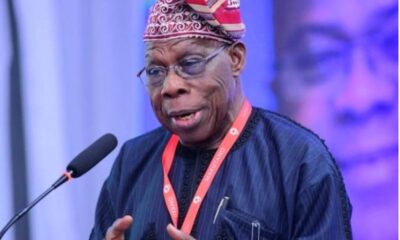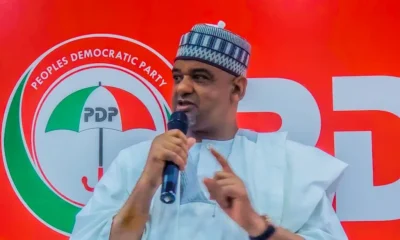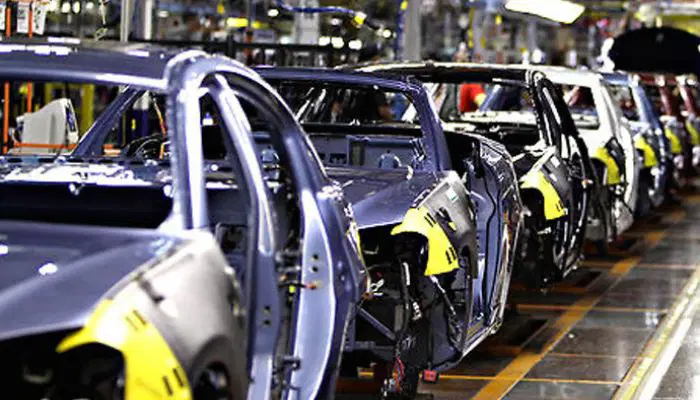Tech
Why Youth Entrepreneurs Are Key To Tackling Climate Change in Africa By Tony Elumelu
Published
6 months agoon
By
Ekwutos Blog
I am a proud Nigerian and a proud African. I am also a philanthropist and entrepreneur—and I have seen firsthand that to effectively tackle climate change within the African context, from Egypt to Nigeria to South Africa, we must look to the people it impacts.
Too often our businesses have not created value on our continent or traded commodities for short-term profit, not long-term investment. Fostering entrepreneurship, sustaining young entrepreneurs, who will grow businesses and create sustainable employment, is a crucial pathway to achieving long-term climate solutions.
In 2010, my wife and I had an idea. Concerned with escalating poverty, we founded the Tony Elumelu Foundation (TEF) and committed $100 million to identify, mentor, and fund young African entrepreneurs—young people with brilliant ideas and the drive to tackle the continent’s most pressing challenges. They lacked capital, connections, and mentors. They lacked luck. We wanted to change that. It was a bold bet aimed at empowering Africa’s most vulnerable and populous demographic, encouraging them to create their own wealth, rather than relying on aid. And the bet paid off.
Since its inception, the foundation has empowered 20,000 entrepreneurs across 54 African countries, who have created 400,000 direct and indirect jobs and generated over $2.3 billion in revenue. We have provided access to business training to more than 1.5 million young people.
Given the scale of the task, we partner with the United Nations Development Program (UNDP), the International Committee of the Red Cross (ICRC), the European Union (EU), and other partners to deepen our reach and impact. We provide funding, mentorship, business training, and advocacy support to entrepreneurs—specifically, in fragile regions, conflict zones, and underserved communities.
Together, we address challenges like youth unemployment, poverty, and insurgency through entrepreneurship. In 2022, we partnered with UNICEF Generation Unlimited (GenU) and IKEA Foundation, to launch a Green Entrepreneurship Program that empowers youth whose businesses address the triple planetary crisis. Of the 20,000 young men and women entrepreneurs that TEF has empowered, more than 500 are directly or indirectly solving challenges related to climate change, and over a third (35%) working in the agricultural sector.
By empowering young people, we are establishing a dynamic engine that drives economic growth and development across the continent. These entrepreneurs also become vital pillars of support within their communities. They are not only creating essential jobs and income, but also uplifting families and breaking the cycle of poverty. And now, more than ever, is the time to bring a climate-lens to this entrepreneurship.
Africa is warming more quickly than the rest of the world. By 2030, an estimated 118 million Africans are projected to face drought, and rising sea levels threaten coastal regions, potentially displacing millions. Climate change is impeding access to basic necessities: water, power, food, and education. But these challenges also offer extraordinary opportunities for those with an entrepreneurial mindset to tackle climate change, while simultaneously creating significant economic value.
For instance, how can we enhance the sustainability of smallholder farmers, which comprise 80% of all farms in sub-Saharan Africa and employ 60% of the continent’s workforce? What strategies can be employed by African nations with vast forests—such as Gabon, Liberia, Guinea-Bissau, and Congo—to effectively leverage these critical carbon sinks?
To unlock the full potential of green solutions in Africa, we must nurture entrepreneurship—and this cannot be achieved by governments alone. We need to integrate government incentive schemes, with the opportunities presented by the private sector. It is imperative that we unite philanthropies, policymakers, and businesses. I refer to this movement as “Africapitalism”—a call for partnership led by the private sector, focused on fostering prosperity for all.
Global warming is not an inevitable fate. Entrepreneurs are inherently problem solvers; they possess the curiosity to explore opportunities and challenges, the creativity to devise innovative solutions, and the determination to transform obstacles into successes. Youth entrepreneurship can be a solution to averting the looming crisis of climate impact. It’s time to harness this power.
You may like


Charitable acts attract divine reward- President Obasanjo


Rivers Emergency Rule: NBA took illegal gift from Fubara – Wike


IMO GOVERNMENT DISOWNS FRAUDULENT SIENNA LEVIES, ORDERS CRACKDOWN ON EXTORTIONISTS


PRESIDENT TINUBU’S EASTER MESSAGE TO THE NATION


APC more divided than PDP – Damagum declares as he receives defectors


Six IMSU Law Graduates Bag First Class at the Nigerian Law School
Tech
Gov Soludo is a greater supporter of Innoson group but our Office in Anambra was demolished without pre-notification from government— Innoson Group
Published
5 hours agoon
April 18, 2025By
Ekwutos Blog
Innoson Vehicle Manufacturing (IVM) has expressed displeasure over the partial demolition of its Head Office, situated on the Owerri-Nnewi road.
Mr Cornel Osigwe, Head of Corporate Communications at Innoson Group, who confirmed the demolition to newsmen, said that there was no pre notification ahead of the demolition which took place on Wednesday.
He claimed that the office perimeter fence, some offices, stair case and the company’s showroom were affected by the partial demolition.
According to him, there was no pre notification ahead of the demolition; it came to us as a surprise.
“We did not know that the building itself was marked for demolition and if it was marked, they should have given us time to relocate.
“The staff were working and they just saw the demolition vehicle demolishing the building while work was going on.
“Some of our staff were trapped in the building, it took the efforts of our other staff to rescue those that were trapped while over 20 vehicles were also trapped.
“A day before the demolition, there was an announcement that there was going to be a demolition and they were going to give one week for the houses that were marked for demolition to relocate.
“The company was not aware that the company was marked for demolition, and even if it was aware.
“There have been a public announcement that all the marked buildings have one week to relocate, but all those things were not considered
“There were other buildings that were close to the head office and marked for demolition were not demolished but they came straight to our building and demolished it, making us to wonder if there was another ulterior motive to it,” he said.
“Gov. Charles Soludo of Anambra has been a great supporter of Innoson Vehicle and Innoson has been a great supporter of the state government.

“But the way and manner that everything happened makes us to wonder if the state government is aware that those handling the demolition have personal vendetta against the company,” he added.
Tech
They only know how to drain data’ – Telecom consumers lament tariff hike, poor network
Published
4 days agoon
April 14, 2025By
Ekwutos Blog
Some telecommunication services consumers in the Federal Capital Territory, FCT have urged Mobile Network Operators to improve their services to match the recent hike in their tariffs.
They made the call in separate interviews with NAN on Monday in Abuja.
The subscribers said despite the increase in subscription rates mobile networks could remain epileptic for hours.
In a publication dated February 6, 2024, the Executive Vice-chairman of the Nigerian Communications Commission, Dr Aminu Maida, said that the commission would hold service providers accountable for poor service delivery.
Mr Ogah Paul, one of the subscribers said he had enough data on his network but could not access the internet because of the epileptic network.
He urged service providers to fix the problems surrounding the poor services.
“The only thing they know is to drain data without any good service delivery. I feel like crying because of a problematic network. I have been receiving server errors since morning.
“To even download and watch a video sent to me since, takes me almost one whole day. “I wonder if members of staff of the service providers are enjoying the service they render to us.
“We cannot make calls, access the internet or even receive calls,’’ he said.
According to him, unfortunately, the network providers put up some of the best adverts about their products and services which they cannot meet.
Mr Victor James, another subscriber said he had enough data but was not able to use it to his satisfaction.
“Why does their data plan not reflect immediately when you buy data? Sometimes it takes as much as 24 hours to reflect.
“I am tired of this. The network is really bad. I have enough data but I cannot use it the way I want.
“I hope the issues get resolved as soon as possible so that I can access my data without further delay,” he said.
However, Ms Josephine Tanko, told NAN that she had no problems with her network providers.
“It is fast and reliable. I think it is the network that gives the best internet speed and quality.
“It will always be my best that is why I will always choose it over any other network,” she said.
She called on networks that did not meet their subscriber’s expectations to ensure that they improved their services.

By Adegboyega Adeleye
The importance of cars in transportation cannot be overemphasised with some countries known for their production.
Transportation is required for work, school, and industry, with car production fast becoming a major producer of revenue and a player in the global was financial market.
Car production is one of the largest economic sectors internationally; however, some countries produce more cars than others. The list of countries by motor vehicle production is based on statistics by the International Organization of Motor Vehicle Manufacturers.
The world’s car manufacturers put another 93.5 million vehicles on the roads in 2023, the last full-year numbers currently available.
This article will explore the top 5 countries with the highest car production.
1. China
China, the world’s biggest manufacturer overall, leads the world in car production. The country’s 2023 production totaled more than 30 million vehicles, adding up to more than 30% of all cars and trucks produced globally.
The largest domestic car manufacturers in China, known as the traditional “Big Four,” are SAIC Motor, Dongfeng, FAW, and Chang’an.
2. United States
The United States–a major automotive producer, known for its large vehicle market–is the second biggest auto manufacturing country with a volume of 10,611,555. This represents about 5.5 percent growth compared to the 10,060,339 produced in 2022.
The United States produces less than half of what China does, having manufactured about 1.8 million cars and 8.3 million commercial vehicles in 2022. The United States’ largest car manufacturers, referred to as the “Big Three,” are General Motors, Ford Motor Company, and Fiat Chrysler.
3. Japan
Japan ranked as the third biggest automobile-producing country in the world with a total volume of 8,997,440 vehicles manufactured in 2023. The country is a significant player in the global automotive industry, known for its engineering and quality.
After a sudden drop in production from 2020-2022 due to the COVID-19 pandemic, Japan produced just under 9 million vehicles in 2023 (8,997,440)–a drop from its pre-COVID total of nearly 9.7 million in 2019.
However, the volume grew by 14.8 percent compared to the 7,835,519 produced in 2022.
Japan’s automotive industry is one of the largest industries in the world. The country’s automotive manufacturers include Toyota, Honda, Daihatsu, Nissan, Suzuki, Mazda, Mitsubishi, Subaru, Isuzu, etc.
4. India
India is the fourth-largest automobile-producing country in the world with a total number of 5,851,507 manufactured in 2023. The volume of vehicles grew by 7.2 percent compared to 5,456,857 vehicles produced in 2022.
Although, India is not renowned in America or Europe as a vehicle manufacturer, the Asian nation produced 5.8 million cars in 2023– an annual increase of 7%. India’s export markets for vehicles include Saudi Arabia, South Africa, and Mexico.
The nation is rapidly growing as an automotive market and producer.
5. South Korea
South Korea is the fifth-largest auto-producing country in the world. The country manufactured a total of 4,244,000 vehicles in 2023, representing a growth of 13 percent from a total of 3,757,049 vehicles produced in 2022.
The major South Korean automobile manufacturers include GM Korea, Hyundai Motor Group and its affiliate, Kia Corporation along with Renault Korea Motors.

Charitable acts attract divine reward- President Obasanjo

Rivers Emergency Rule: NBA took illegal gift from Fubara – Wike

IMO GOVERNMENT DISOWNS FRAUDULENT SIENNA LEVIES, ORDERS CRACKDOWN ON EXTORTIONISTS
Trending

 Trending6 months ago
Trending6 months agoNYA demands release of ‘abducted’ Imo chairman, preaches good governance
- Business6 months ago
US court acquits Air Peace boss, slams Mayfield $4000 fine

 Politics6 months ago
Politics6 months agoMexico’s new president causes concern just weeks before the US elections
- Entertainment6 months ago
Bobrisky transferred from Immigration to FCID, spends night behind bars
- Entertainment6 months ago
Bobrisky falls ill in police custody, rushed to hospital

 Politics6 months ago
Politics6 months agoRussia bans imports of agro-products from Kazakhstan after refusal to join BRICS

 Politics6 months ago
Politics6 months agoPutin invites 20 world leaders
- Politics1 year ago
Nigerian Senate passes Bill seeking the establishment of the South East Development Commission.

